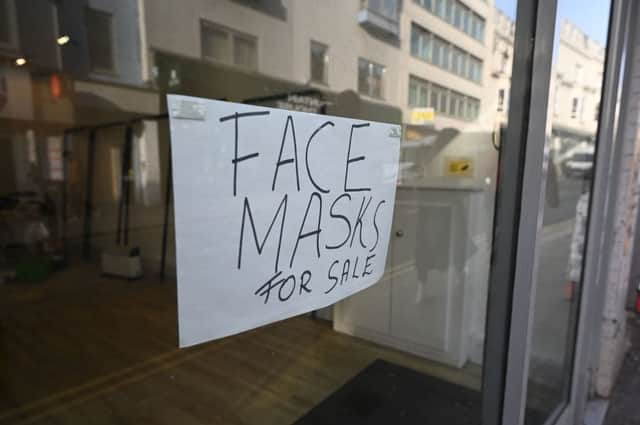Coronavirus: everything you need to know - and how to protect yourself


With multiple cases of coronavirus now confirmed in the UK, here is a guide to what you need to know about COVID-19, and what you can do to protect yourself.
What are the symptoms?
The symptoms of coronavirus are:
• a cough
• a high temperature
• shortness of breath
But these symptoms do not necessarily mean you have the illness. The symptoms are similar to other illnesses that are much more common, such as cold and flu.
Advertisement
Hide AdAdvertisement
Hide AdHowever, if you have fever, cough and difficulty breathing, seek medical attention and call in advance.
Follow the directions of your local health authority who will have the most up to date information on the situation in your area.
Calling in advance will allow your health care provider to quickly direct you to the right health facility. This will also protect you and help prevent the spread of viruses and other infections.
How is the virus spread?
Because it’s a new illness, we do not know exactly how coronavirus spreads from person to person. Similar viruses are spread in cough droplets. It’s very unlikely it can be spread through things like packages or food. Viruses like coronavirus cannot live outside the body for very long.
How can I protect myself?
Advertisement
Hide AdAdvertisement
Hide AdWash your hands frequently:Regularly and thoroughly clean your hands with an alcohol-based hand rub or wash them with soap and water. Washing your hands with soap and water or using alcohol-based hand rub kills viruses that may be on your hands.
Maintain social distancing:Maintain at least 1 metre (3 feet) distance between yourself and anyone who is coughing or sneezing. When someone coughs or sneezes they spray small liquid droplets from their nose or mouth which may contain the COVID-19 virus if the person coughing has the disease.
Avoid touching eyes, nose and mouth:Hands touch many surfaces and can pick up viruses. Once contaminated, hands can transfer the virus to your eyes, nose or mouth. From there, the virus can enter your body and can make you sick.
Practice respiratory hygiene:Make sure you, and the people around you, follow good respiratory hygiene. This means covering your mouth and nose with your bent elbow or tissue when you cough or sneeze. Then dispose of the used tissue immediately. Droplets spread virus. By following good respiratory hygiene you protect the people around you from viruses such as cold, flu and COVID-19.
Is there a treatment?
Advertisement
Hide AdAdvertisement
Hide AdThere is currently no specific treatment for coronavirus. Antibiotics do not help, as they do not work against viruses. Treatment aims to relieve the symptoms while your body fights the illness. You’ll need to stay in isolation away from other people until you’ve recovered.
How did it start?
This virus is not really ‘new’ - it is just new to humans, having jumped from one species to another.
Many of the early cases were linked to the South China Seafood Wholesale Market, in Wuhan.
In China, a lot of people come into close contact with animals harbouring viruses - and the country’s dense urban population means the disease can be easily spread.
Advertisement
Hide AdAdvertisement
Hide AdThe current virus - one of seven types of coronavirus - does not seem to be mutating so far. But while it appears stable, this is something scientists will be watching closely.
How deadly is it?
Based on data from 44,000 patients with this coronavirus, the World Health Organization says:
• The proportion dying from the disease, which has been named Covid-19, appears low (between 1% and 2%)
• The figures are unreliable. Thousands are still being treated but may go on to die - so the death rate could be higher. But it is also unclear how many mild cases remain unreported - so the death rate could also be lower.
Advertisement
Hide AdAdvertisement
Hide Ad• To put this into context, about one billion people catch influenza every year, with between 290,000 and 650,000 deaths. The severity of flu changes every year.
How do you self-isolate?
If you have been told to self-isolate, you need to stay indoors and avoid contact with other people for 14 days. It is important to follow the advice for the whole period, even if you do not have any symptoms.
Do:
• stay at home
• separate yourself from other people – for example, try not to be in the same room as other people at the same time
• only allow people who live with you to stay
• stay in a well-ventilated room with a window that can be opened
Advertisement
Hide AdAdvertisement
Hide Ad• ask friends, family members or delivery services to carry out errands for you, such as getting groceries, medicines or other shopping
• make sure you tell delivery drivers to leave items outside for collection if you order online
• clean toilets and bathrooms regularly
• think about a bathroom rota if a separate bathroom is not available, with the isolated person using the facilities last, before thoroughly cleaning the bathroom themselves
• use separate towels from anyone else in the household
• wash crockery and utensils thoroughly with soap and water; dishwashers may be used to clean crockery and cutlery
Advertisement
Hide AdAdvertisement
Hide Ad• stay away from your pets – if unavoidable, wash your hands before and after contact
Don’t:
• invite visitors to your home or allow visitors to enter
• go to work, school or public areas
• use public transport like buses, trains, tubes or taxis
• share dishes, drinking glasses, cups, eating utensils, towels, bedding or other items with other people in your home